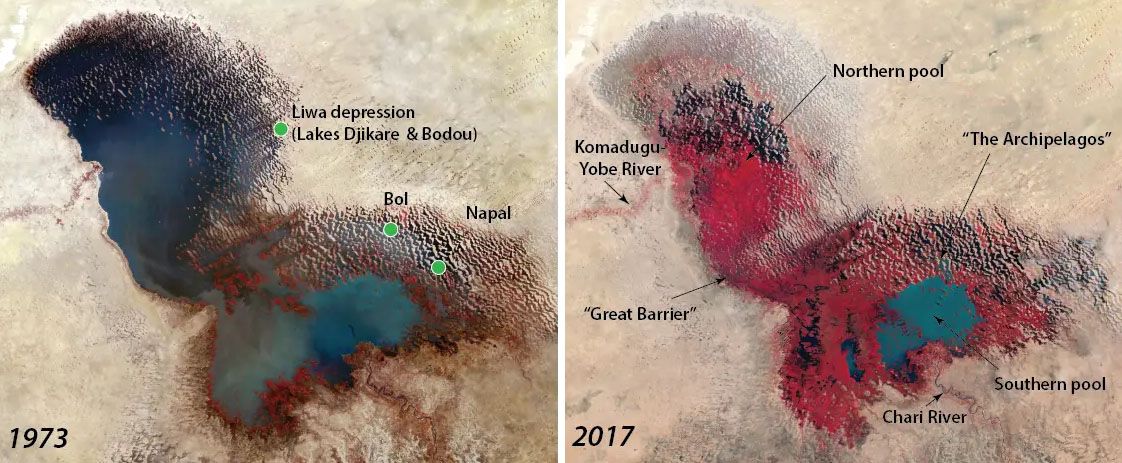A shrinking Lake Chad is leading to conflicts and gender based violence

Adenike Oladosu has observed the effects of the vanishing Lake Chad, located at the conjunction of Cameroon, Chad, Niger, and Nigeria. The freshwater lake has shrunk dramatically since the 1960s due to unplanned irrigation and climate change, with women at the forefront of the prevailing conflicts and crises.
Over 30 million lives depend on Lake Chad for survival. It has shrunk by over 90% since the 1960s, due to unplanned irrigation and climate change, and it is likely to disappear in the coming decades if we do not take immediate action.
This has now grown to a multifaceted crisis. Lake Chad cuts across the Sahel region in which there is one of the world’s worst humanitarian crises due to severe drought, primarily from direct depletion of our natural resources and desertification. This has a long impact on people’s livelihoods, resulting in poverty, food insecurity, and hunger.

Lake Chad borders Cameroon, Chad, Niger, and Nigeria leading to cross border insecurity. Who knows how long it will take Lake Chad to be recharged: a decade, a century? While we are going about business-as-usual, climate change is wreaking havoc in Lake Chad – things are falling apart.
On top of this, Lake Chad is known to be an endorheic lake meaning it doesn't flow into the ocean. With its cross-border influence the shrinking of the lake has led to conflict, violent attacks, and gender based violence. During my studies, the impact of this shrinking Lake Chad on Africa dawned on me – it is resulting in a culture of "survival of the fittest" which is a grave threat to human rights.
In these desperate times, women are disproportionately affected. As family livelihoods which depend on the lake fall apart, young girls are sometimes sold as brides to get income and they are sexually harassed in the process of selling on the street. Several years ago some school girls were kidnapped in Chibok, Borno in Nigeria as a result of the instability in this region. The northern part of Nigeria is most affected by the shrinking Lake Chad, with women and girls at the forefront of this.


Climate change creates a vacuum in which scarcity of natural resources encourages conflict such as the farmer and herdsmen clashes that claim the lives of thousands of people. The consequences are also seen in migration. People migrate to the centre, creating more pressure on limited natural resources towards the middle belt. Climate change is a weapon of mass destruction, creating an environment of instability where human rights are no longer met. The world is feeling the impact of climate change but Africa is disproportionately affected.
The higher the rise in temperature, the greater the impacts of climate change. In recent years, natural disasters such as cyclones are happening at an increasing rate. We should all be worried with this development since climate change exacerbates other crises such as hunger and health epidemics.
The crises in the Lake Chad region are being driven by both climatic and non-climatic factors – this affects the availability of natural resources key to sustaining livelihoods negatively, as well as the socio-economic status of people leading to forced migration and conflict. At the I Lead Climate, we are advocating for the restoration of Lake Chad as we believe the restoration is key to silencing the guns in Africa for peace, security, and sustainable development. It is centred on climate education which plays a vital role in creating the fundamental change we need in our society.
Close to 60 percent of the world’s population currently resides in countries that are vulnerable to climate change consequences similar to those in Lake Chad, and that number is projected to rise to 75 percent by the end of the century. We should all be worried about these developments, because the larger the environmental instability, the larger the humanitarian crises, which will affect us all. A green and socially just recovery is necessary if we must win the race against climate change.
Lake Chad and the women living in its surroundings remain indispensable towards the actualization of our global goals.

Member discussion